On Tuesday 21 February, the Tunisian President Kais Saied shocked the world with his harsh and racist statement against the «hordes of clandestine migrants» coming to Tunisia from sub-Saharan African countries, while he was presiding the session of the National Security Council that he had convened to discuss the subject. Saied communicated in a Presidential press release the need to curb the arrival of a large number of irregular migrants from sub-Saharan African countries, who are a source of «violence, crimes and unacceptable acts», with urgent measures.

What is more alarming is the President’s insistence on a conspiracy theory involving «a criminal plan devised at the beginning of this century to modify Tunisia’s demography», with the aim of making «Tunisia solely an African country and not a member of the Arab and Islamic world», a rhetoric close to the ‘great replacement’ theory brought forward by the white far right in France and other Western countries. This white supremacy storytelling ignited the spark of violence and racism against the sub-Saharan community across Tunisia and led to countless violations of basic human rights. According to the declarations of the spokesperson of the Tunisian Forum for Economic and Social Rights, «The date of 21 February transformed the state into a state that internalizes racist policies, […] a state that links the sub-Saharan migrants’ presence solely with violence and crime. This declaration is a disgrace for Tunisia».
Unprecedented wave of arbitrary detentions and racist behaviours
The presidential press release was matched by an unprecedented wave of police arrests and arbitrary detention of sub-Saharan Africans, that started few weeks before the Presidential statement went public. As documented by the association Union of Ivorians in Tunisia, between 10 and 15 February around 300 sub-Saharan individuals, mostly Ivorians, were detained by the police.
Even some students were arrested even though they were in full compliance with their residence documents. Although they were eventually released, one of them spent six days in detention, half of them without food, according to the press release of the Association of African students and trainees in Tunisia. In the wake of these arbitrary arrests, on 23 February the association invited the sub-Saharan African students with the same press release to stay at home, not even to get out in order to attend classes at the university.
The wave of xenophobia that swept Tunisia did not stop there. Allegedly, some physical assaults against some Ivorians took place between the night of Wednesday 23 and Thursday 24 February in Tunis (La Soukra), where an entire building inhabited by sub-Saharans was cleared by a group of Tunisian citizens, under unclear circumstances. On the evening of Saturday 25, several witnesses reported the ransacking and theft of property from the homes of sub-Saharan Africans in the Ariana district of Tunis and in the city of Sfax. An aggression of four Ivorian students of the University of Manar was equally reported on Sunday 26.
Even social media has been flooded by hate speech, increasing not only the sub-Saharan community’s state of anxiety and concern, but also worrying the numerous, black-skinned Tunisian population. Alarmingly, many evictions without notice of sub-Saharan tenants by their Tunisian landlords have been reported, leaving people homeless in some cases. These incidents were reportedly caused by a fear of retaliation by the Tunisian police against the landlords who rent out their properties to undocumented sub-Saharan Africans. According to the law of 8 March 1968 on the status of foreigners in Tunisia, «any person who knowingly assists directly or indirectly or attempts to facilitate the entry, exit, movement or illegal residency of a foreigner in Tunisia shall be liable to imprisonment for a period of between one month and one year and to a fine of between 6 and 120 dinars». If renting to undocumented migrants was largely tolerated until now, overnight after the Presidency’s statement mass expulsions occurred, ranging from houses and workplaces.
A cyclical phenomenon emblematic of non-reception migration policies
The wave of arbitrary detentions of sub-Saharan individuals is not a new phenomenon in Tunisia. On the contrary, back in 2019 the Tunisian Forum for Economic and Social Rights was reporting cases of migrants and asylum seekers being illegally detained in the Wardia centre and sometimes deported to their home countries. Likewise, pushbacks and illegal refoulement were reported at the Carthage airport. A Central African citizen who has been residing in Tunisia since 2017 complained that upon his arrival the authorities did not let him in, initially: «my first difficulty was at the airport, when I came here to Tunisia with a study visa. The Tunisian authorities refused to let me leave the airport, they wanted to repatriate me». Then, from December 2021 to February 2022, student associations and the testimonies of some victims have denounced arbitrary arrests of Sub-Saharan individuals and the imposition of DNA tests without consent, which happened even when they exhibited their papers and student cards.

Eviction of sub-Saharans from Tunisian landlords had already been observed in 2022. For example, according to an Ivorian informant, in June 2022 the police cleared out an entire building in the suburbs of Sfax that was inhabited by sub-Saharan Africans. At that time, Tunisian landlords in Sfax, namely in the neighborhood of Saltnia, were reportedly reluctant or refused to rent their properties to sub-Saharans. Sfax is renowned for hosting a large community of sub-Saharans, who work extensively in both the formal and informal economy.
What are the underlying reasons for the unfolding events and this wave of arbitrary arrests? In this sense, there are at least three tracks to follow:
- one leads to a security need of responding to crime that exploits the vulnerability of the irregular migrant community,
- one to international pressure to regulate migratory movements towards Italy, which gets to decide who is disposable and who can continue their migration to the Global North following the principle of ‘borderization’,
- and one to local pressure from a nationalist party that aims at expelling the sub-Saharan community.
Before delving into this analysis, it is first necessary to investigate why some foreigners find themselves residing irregularly in Tunisia.
The international migration framework in Tunisia
Tunisia is both a destination and transit country for international migration. However, it became mainly a transit country, thanks to the proximity with the Italian coasts. On many occasions, it turns out to be a ‘forced’ destination for migration routes of individuals who want to arrive in Europe but discover the dangers of the crossing at sea and the wall of the Tunisian coast guard financed by the Italian government. Nevertheless, it is a privileged destination for many fellow African students that want to pursue higher education studies. As of 2020, almost 59,000 foreigners, including refugees and asylum seekers, were residing in Tunisia according to the national statistics. Among these people, 21,000 were of sub-Saharan origin, although official figures might underestimate the extent of the sub-Saharan presence in Tunisia, with most migrants living irregularly. In any case, these figures are small if compared with that of migrants living in Libya and Algeria. As of 2021, around 597,000 migrants were estimated to be residing in Libya, and around 242,000 in Algeria.
Even though the number of migrants is not that high, institutions persist in excluding them from national policies and their planning. In many cases the majority of sub-Saharan migrants are prevented from working legally because of outdated national laws regulating the access of foreigners to the labour market. The entry, stay, and exit of foreigners in Tunisia is regulated by Law No.1968-0007 of March 8, 1968, on the status of foreigners in Tunisia and Law No.2004-6 of February 3, 2004, amending and supplementing Law No.75-40 of May 14, 1975 on passports and travel documents. The strict national labour code, from articles 258 to 269, applies the principle of ‘national preference’ to the labour market, that is the prioritization of Tunisian workers over foreigners with the same level of qualification upon recruitment. This complicates the access of low-qualification jobs to foreigners, since it is difficult to claim that there are no Tunisian nationals available and willing to be contracted and work in these low-skill positions.

Even more than that, the absence of migration management from the Tunisian state lies at the origin of irregular residency in the country. The administrative and legal conditions for obtaining residence permits are not made easy or available to sub-Saharan foreigners, who are discriminated against in comparison to European foreigners. Between 2011 and 2017, sub-Saharan migrants represented between 2% and 4% of the total number of foreign workers who obtained a work permit. Conversely, according to a study, work visas for Western Europe accounted for the 40% of the total number of foreign workers over the same period, despite Europeans making up less than half of the sub-Saharan population in 2020. As a result, the systemic racialisation of the visa system condemns many people to irregularity and invisibility. When their residence permits expire, penalties for overstay increase daily until they reach a maximum cap of 3,000 Tunisian dinars. As they cannot find contracted jobs, some resort to informal labour and others to crime to eke out a living. By the same token, the Tunisian community itself relies extensively on informal labour, since almost half of the population works in the informal sector (44.8%), according to the National Institute of Statistics. Economic marginalisation and ghettoisation create tensions between the Tunisian and sub-Saharan communities, and even within the same sub-Saharan communities.
Even if the sub-Saharan migrant works legally with a contract, in many cases the local police station does not fully cooperate and obstacles the obtention of residence permits for sub-Saharan Africans. C., a 30-year-old Ivorian, agrees to speak under anonymity. He attempted to apply for a residence permit to the police station in 2021, while holding a valid passport, a regular employment contract validated by the Ministry, and a rental agreement. Once there, the police claimed that issuing a residence permit was not part of their duties. C. started shuttling between two different police stations in Montplaisir and La Soukra, where the staff kept repeating that they could not assist him, to the point that C. just abandoned the idea of getting legal residency.
A short-sighted repressive response in the absence of long-term policies
For at least the last five years, arbitrary arrests have been a pattern of migration management in Tunisia, while political leaders deliberately sidelined immigration from the political agenda. In one way, incarceration is one of the main tools that the Tunisian state cyclically uses to deal with undocumented migrants, as the studies of the Tunisian Forum for Economic and Social Rights show. On the other hand, sometimes it appears to be a retaliatory measure taken by security apparatus to respond to isolated episodes of crime happening within the sub-Saharan African communities. Some evidence points in this direction. On 30 May 2022, a Guinean citizen was killed during a violent fight that broke out in Sfax between some Guineans and Cameroonians. On that occasion, soon after the incident, in June 2022 the police cleared out an entire building that was inhabited by sub-Saharan Africans, as an anonymous Ivorian informant reported.
Eric, Ivorian and illegal in Tunisia
10/01/2019

Similarly, on 6 February 2023 the murder of a sub-Saharan African woman committed by a sub-Saharan gang, as reported by the Union of Ivorians in Tunisia, could be tracked back as one of the reasons behind the surge of arbitrary arrests in early February. The similar pattern of police reaction after the two events does not seem to be a mere coincidence. Therefore, even though the networks of criminality are a small minority, the sub-Saharan community has become a scapegoat to be hunted down as a whole thanks to ignorance and distorted media coverage of the events, without distinguishing between criminals and the law-abiding majority. Evidently, the migration management aligns more with a repressive security approach, instead of addressing structural problems that have been afflicting international migration in Tunisia for decades. An important network of NGOs, headed by the Tunisian Forum for Economic and Social Rights, has long been calling for extensive regularisation for all undocumented migrants, to which the Tunisian governments have so far turned a deaf ear.
Institutionalising repression and racism in Tunisia: EU externalisation policies and ‘borderization’
The novelty element is not the wave of institutional racism, but the scope of repression tied with unprecedented racist and violent behaviours from the Tunisian society and the narrative employed by institutions. What is more striking is that the statement is coming from the state’s highest institutional office, the Presidency of the Republic, which has seemingly legitimised the spread of hatred and the use of violence by extremist factions of society. Moreover, the statement openly contradicts Kais Saied pan-African declarations during the sixth European Union – African Union Summit in February 2022, where he claimed that «Africa belongs to Africans».
So, what are the reasons behind the sudden shift in position and communication? Some experts believe that this campaign might serve the purpose to divert the attention of the public opinion from the arrests of journalists and political opponents, in a period when Tunisia is witnessing a restriction of fundamental political freedoms and the President has been ruling by decree since July 2021.
However, a fair amount of evidence links the current international migration management and the wave of repression in Tunisia with the EU externalisation of migration policies. Since the late 1990s, the EU has been attempting to outsource migration management to third countries (bordering or not bordering ones), in order to prevent migrants, including Tunisian nationals, other nationalities and asylum seekers, from reaching EU territory. As many scholars pointed out, these policies are applied extensively in North African and Middle Eastern countries, including Tunisia, as a mean to create a kind of buffer or containment zone against irregular migration. This would allow in turn EU member states to avoid any legal obligations towards migrants and potential asylum seekers.
Nonetheless, this EU strategy has been countered by Tunisia’s resistance to accept the EU migration policies. The government’s reluctance to endorse a more regulatory legal framework for migration is mostly attributed to a fear of the effects of the broader EU strategy of externalizing migration controls and to the absence of a majority within Tunisian society that politicizes the issue through a human rights lens. Already in 2018, the Tunisian ambassador at the European Union was declaring «We do not have the capacities nor the means to organise reception centers». If on one hand the Tunisian state is officially refusing to update and modernise the migration legal framework, for example by refusing to ratify an asylum law, on the other hand it accepts the million-dollar funds from the Italian government to upgrade the capacities of its coast guard and the maintenance of its vessels.
Between 2011 and 2022 alone, in the context of border control and migration movements, the Italian state granted Tunisia more than 47 million euros, much of which was spent on sending boats to the Tunisian coast guard. According to the spokesperson for the Tunisian Forum for Economic and Social Rights Romdhane Ben Amor, the Tunisian state itself should be held responsible for the increased presence of irregular migrants on its territory. He claimed during a TV show that «the Tunisian state from the past three or four years has been going out and intercepting at the high seas the vessels of migrants departing from Libya. If [the Tunisian state] has agreed to play the role of coastguard of the European borders, then it is itself that has brought the migrants here».
The suspicion that the recent wave of repression is directly linked to an Italian influence is due to the visit in Tunisia on 18 January of the Italian Deputy Prime Minister and Minister of Foreign Affairs Antonio Tajani and the Italian Minister of the Interior Affairs, Matteo Piantedosi. The first topics on the meeting agenda were the stability of Tunisia and the irregular migration movements from Tunisia to Italy. «We have a common commitment and vision against illegal immigration», wrote Tajani on his Twitter account. He added, «We agreed that this is not just a security problem, but to solve it, we need to get to the root of it». The priority to combat migration in the North African region is also proven by his subsequent visits to Egypt and the handover of a patrol boat, the first of five, to the Libyan coast guard on 6 February. After which not only did Tajani overlook the execrable management of the arrests in Tunisia but congratulated his Tunisian counterpart over a phone talk. «The Italian government is at the forefront in supporting Tunisia in border control activities», he stated on 27 February. On 1 March, the Italian Prime Minister Giorgia Meloni called the Tunisian Prime Minister Najla Bouden. During the call, she indicated «Italy’s willingness to continue to support Tunisia financially, also together with the European Union, providing its backing also in relation to international financial institutions». This backing would be crucial for Tunisia, which is trying to negotiate a new loan deal with the International Monetary Fund for years. Apparently, this unconditional support was not enough to allay concerns of, one hand, the World Bank,-which is going to pause future work with Tunisia after the President stance on migrants from African countries, according to Reuters-, nor to allay concerns of the IMF, on the other hand, which just voiced its concerns about «the situation in Tunisia, after an unprecedented wave of violence against Black migrants».
The concept of ‘borderization’, as conceived by Achille Mbembe in his paper Bodies as Borders, seems to fit well with the arbitrary arrests and operations of the Tunisian coastguard, which are designed «to slow, in some cases altering, the movement of some classes of population […] in the name of security and protection of identity». These words of Mbembe echo those of the statements of the Presidency of the Republic. The hitherto invisible, black-skinned sub-Saharan (and Tunisian) community was suddenly confronted with the ‘borderization’ on their own bodies, that is «the process by which certain spaces are transformed into uncrossable places for certain classes of populations, who thereby undergo a process of racialization». In this way, the Tunisian public place, such as streets, markets, workplaces turned into inaccessible and uncrossable locations, while the general paranoia forced them to confine themselves indoors, for those lucky ones who still had a home. It was immediately noticeable how in the week following the statement, black-skinned individuals were absent from public places. The manhunt against black sub-Saharan Africans of these days depicted them as ‘heaps of human flesh’ and is being normalised not only by the highest Tunisian institutional office, but also endorsed by the declarations of representatives of a neighbouring state.
Endogenous lobbying from the Tunisian Nationalist Party
Adding to the international incentives to regulate migration, the role of a local political party with nationalistic and identitarian paranoia has recently come to the fore, through an investigation conducted by Najla Ben Salah. During the past two or three months, the Tunisian Nationalist Party headed by Sofien Ben Sghaïer, which has been officially recognised as a party from 2018, has been leading a campaign aiming at expelling undocumented migrants from sub-Saharan Africa. The party has been particularly active in the governorate of Ariana, and it has even launched a petition that has garnered around a thousand signatures, which would include, among other points, the repeal of Organic Law No. 2018-50 of 23 October 2018 on combating racial discrimination. According to the same investigation, the Nationalist Party would have a privileged channel with the authorities, since it submitted cases and asked interventions to the Ministry of the Interior, the Presidency of the Government, and the Presidency of the Republic, as well as to the governors of regions hosting large sub-Saharan communities.
More notably, some members of the political bureau of the Nationalist Party are fervent early supporters of Kais Saied. As Kais Saied was elected as a populist independent candidate, his recent statement, which is aligned with the Tunisian Nationalist Party’s programme, could bring him valuable popular support, at a moment when his popularity is at an all-time low, following disastrous electoral turnout rates.
The emergence in 2018 of a nationalist party which embraces racist policies does not come as a surprise, given the global evolution of the far-right movements. Nevertheless, according to a study written by Marta Scaglioni, the democratisation process subsequent to the 2011 Revolution might have «freed up previously repressed racist sentiments in the public sphere and enabled Tunisians who felt endangered by diversity to voice their fears». Even if this means acting schizophrenically, because the Tunisian Nationalist Party intends to enact the same discriminatory process and the ‘borderization’ that the Global North, namely Europe, bestows to fellow Tunisians on the Old Continent.
The reaction of other African countries
In the wake of the statement, the African Union strongly condemned the violence and racism perpetrated against fellow Africans and stressed the importance of «treating all migrants with dignity […] and prioritize their safety and human rights». In addition, Souleymane Diallo, the spokesperson for the Guinean traders, announced the suspension of imports of Tunisian goods. The boycott came as a retaliatory measure on 2 March, the same day when 49 Guineans were repatriated from Tunisia and arrived at the international airport in Conakry. «We cannot continue to improve or help the economic development of a country that calls for the extermination of a race to which we belong», commented Diallo.
Guinea was not the only country that organized assisted repatriation. On Saturday 4, 135 Malian citizens arrived in Bamako, where they were welcomed by the Minister of Defence, according to the Malian News Agency. Ivory Coast has mobilised the national airline, Air Côte d’Ivoire, to repatriate nearly 500 Ivorian citizens from Thursday 2 March to Saturday, as reported by APR News. Particularly, the Ivorian community is the most numerous in Tunisia, with estimations by the Union of Ivorians in Tunisia of at least 20,000 Ivorians living in the country. The significant presence of Ivorians in Tunisia is also explained through the move of the African Investment Bank from Abidjan to Tunis from 2003 to 2014, which entailed the arrival of senior officials, employees, and their entourage. Many Ivorians moved to Tunisia, where the majority enrolled in universities, also thanks to direct flights between the capital cities and visa-free entry.
In this context, the lack of reaction from African governments, and especially from Abidjan, is controversial. As a matter of fact, very few high-ranking officials of African countries have condemned the treatment suffered by their citizens in Tunisia, perhaps fearing reprisals against those still in Tunisian territory, with the notable exception of the President of the African Union Commission Moussa Faki Mahamat. This despite criticism of African parliamentary groups and civil society organisations.
Nevertheless, a recent change of course and a more cooperative approach of the Tunisian authorities could equally lie behind the silence of sub-Saharan African countries. On Sunday 5 March the Presidency of the Tunisian Government released a statement, stressing that « it is an honour for Tunisia to be an African state. Africans are our brothers. During recent years, Tunisia has not stopped calling for ‘Africa to be for Africans’». More than that, the statement announces very important administrative changes «to facilitate the procedures for foreigners residents and to protect various communities». First of all, Tunisian authorities declared a penalty waiver for all those irregular residents who chose the voluntary repatriation, in accordance with their countries of origin. Among other relevant measures, the «delivery of one-year residence permits to students from sisterly African Countries» and the extension of the residence permit from three months to six months stand out.
It seems that this sudden turn in communication was dictated by the risk of being isolated internationally, after the fierce outcry from civil society following media coverage of the controversial events. However, the statement fails to acknowledge the harm that has been done to sub-Saharan migrants and does not offer any apologies to them nor to their countries of origin. Even though the statement announces a number of important reforms for the stay of sub-Saharan Africans in Tunisia, some of them seem more promises with little hope of seeing them implemented. They are unlikely to be fulfilled given the government’s lack of action on this issue in the past, Tunisia’s non-receptive migration policies and the law enforcement’s security-based and discriminatory approach, which often rejects lawful visa applications. Even more alarming is the creation of a hotline within the Ministry of Interiors for sub-Saharan individuals to report any violations or forms of abuse, as they are supposed to report to the same perpetrators of arbitrary arrests.
Solidarity from civil society: outcry against racism
Violence and racism have plunged the sub-Saharan community in Tunisia into fear. As many people stayed at home out of fear of aggressions, on Saturday 25 February a demonstration gathering about a thousand people marched peacefully in solidarity with the sub-Saharan community chanting ‘الشعب يريد العدالة الإنسانية’ [The people want social justice] and ‘Solidarity for all the undocumented migrants’ against the racist declaration of the Presidency of the Republic.

A crowdfunding campaign has been organized on social media to raise funds to support Sub-Saharan migrants with housing, food, and medication. Some of them slept or are still sleeping outdoors in temperatures below ten degrees in front of the embassies of their countries waiting to be repatriated, under the silence of the international community. Not even the International Organisation for Migration in Tunisia released a statement defending the migrants. However, the Director General of IOM António Vitorino met the Tunisian Minister of Foreign Affairs on 28 February, which suggests under-the-radar work trying to capitalise on diplomatic leverage. What cannot be predicted is how the situation will develop in the coming weeks and especially whether the Tunisian authorities will abide by the international treaties on migration, implement the promised reforms and reassure the sub-Saharan community which now lives in fear.
Related Article
EU-Tunisia: Why the Dutch were compelled to strike a deal with an autocrat
On July 16, the European Commission signed a 'Memorandum of Understanding’ with Tunisia, granting the country millions of euros to prevent migrants and refugees from crossing the Mediterranean to seek shelter in Europe. But why did the Dutch prime minister play a pioneering role in the conclusion of the Tunisia deal, if only a small proportion of the migrants along this route travel on to the Netherlands? This analysis examines how the Dutch anti-migration policy became self-evident.
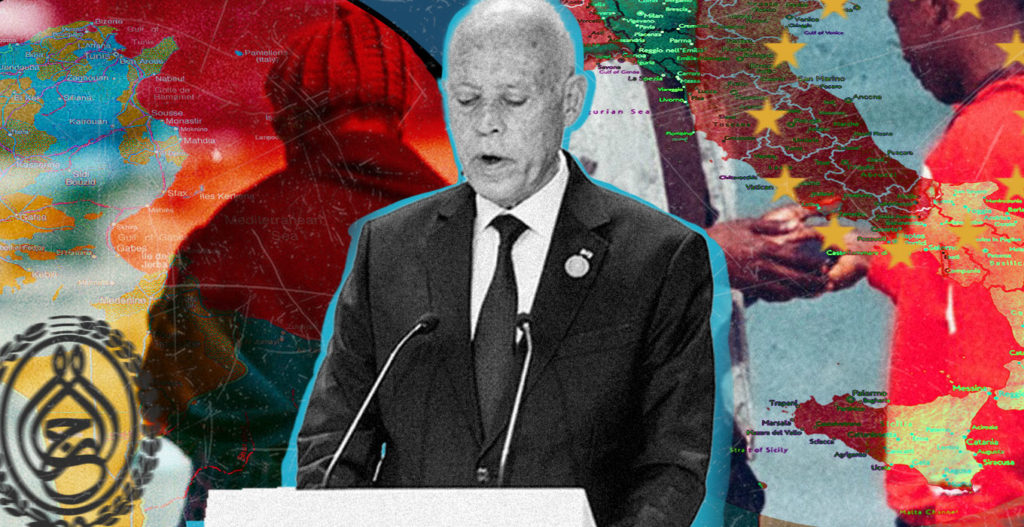
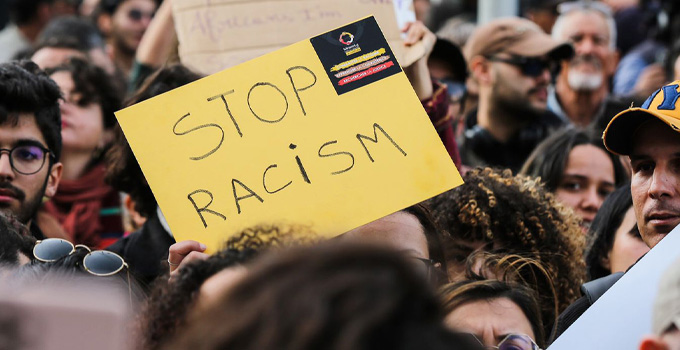



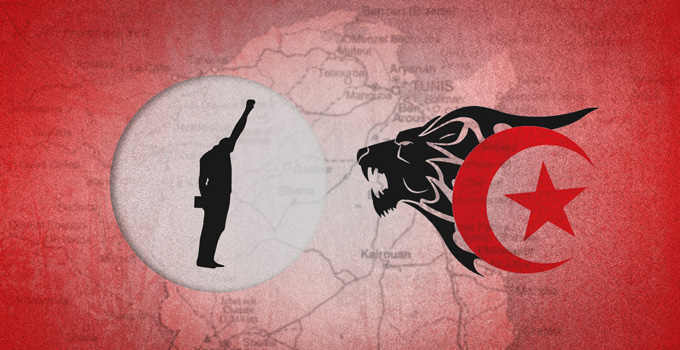
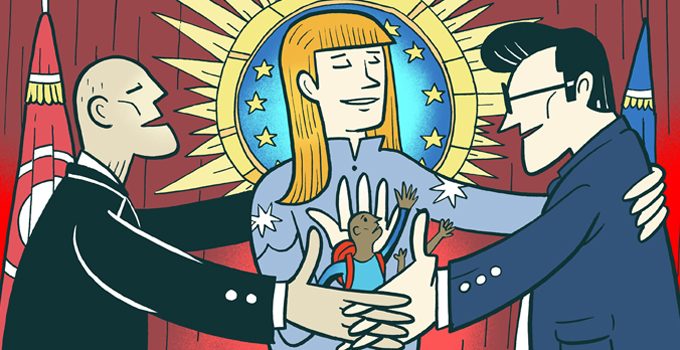
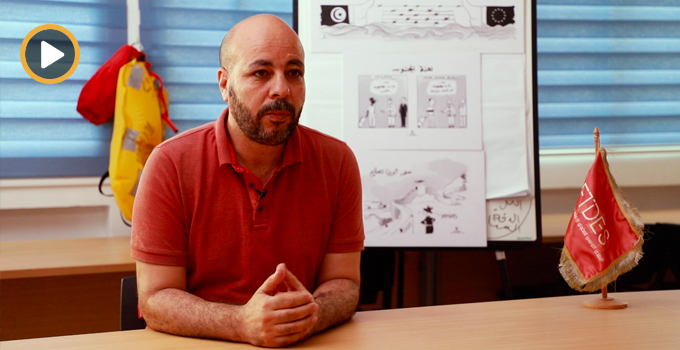
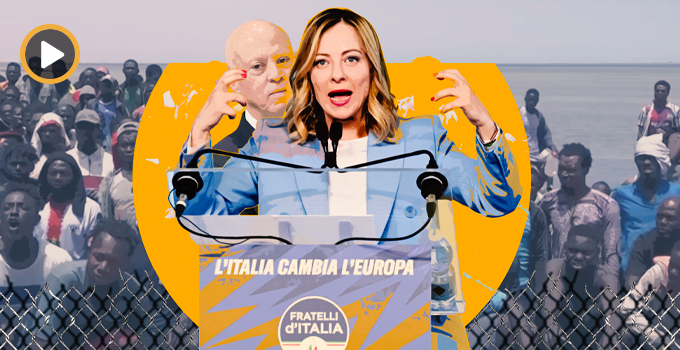


iThere are no comments
Add yours